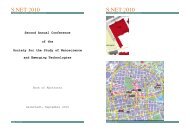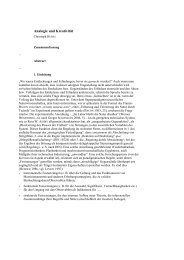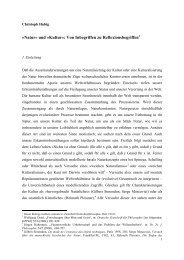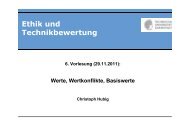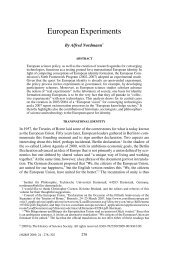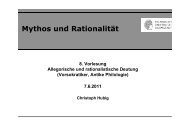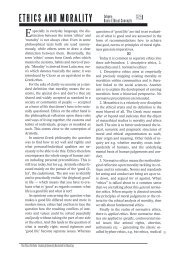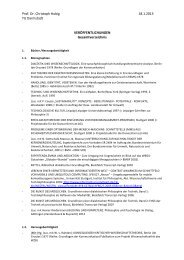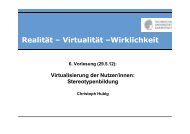If and Then: A Critique of Speculative NanoEthics - Common Sense ...
If and Then: A Critique of Speculative NanoEthics - Common Sense ...
If and Then: A Critique of Speculative NanoEthics - Common Sense ...
You also want an ePaper? Increase the reach of your titles
YUMPU automatically turns print PDFs into web optimized ePapers that Google loves.
32 Nanoethics (2007) 1:31–46<br />
The contemporary fascination with space travel,<br />
artificial intelligence, <strong>and</strong> genetic engineering<br />
has led to the resurrection <strong>of</strong> the age-old visions<br />
<strong>of</strong> the transcendent power <strong>of</strong> artifacts <strong>and</strong><br />
techniques to transform the human condition.<br />
We are constantly being presented with retellings<br />
<strong>of</strong> the classic tales <strong>of</strong> conquest <strong>and</strong> ingenuity that<br />
can be subsumed under the “myth <strong>of</strong> progress.”<br />
It is the “if only” syndrome, the eternal technical<br />
fixation that is deeply embedded in our underlying<br />
conceptions <strong>of</strong> reality. <strong>If</strong> only we could<br />
develop an even better instrument <strong>of</strong> production<br />
or destruction, if only we could tame another<br />
force <strong>of</strong> nature to provide us with unlimited<br />
energy, then our wealth <strong>and</strong> our capacities – the<br />
values by which we measure progress – would<br />
be so much greater. More than two millennia<br />
after the sun melted the wings <strong>of</strong> Icarus for<br />
coming too close, we are still under the spell <strong>of</strong><br />
hubris, trying to fly higher <strong>and</strong> higher. [16, p.5]<br />
Mikael Hård <strong>and</strong> Andrew Jamison’s cultural<br />
history <strong>of</strong> technology <strong>and</strong> science identifies a conditional<br />
that extends beyond genetic engineering also to<br />
nanotechnology [21]. To be sure, technological<br />
dreams <strong>and</strong> the conditional “if only we could do<br />
this...” are by no means ethically neutral. But<br />
whatever the ethical concerns with technological<br />
hubris may be, they are becoming exacerbated by a<br />
radical foreshortening <strong>of</strong> the conditional, that is, by<br />
what one might call the “if <strong>and</strong> then” syndrome. An<br />
if-<strong>and</strong>-then statement opens by suggesting a possible<br />
technological development <strong>and</strong> continues with a<br />
consequence that dem<strong>and</strong>s immediate attention. What<br />
looks like an improbable, merely possible future in<br />
the first half <strong>of</strong> the sentence, appears in the second<br />
half as something inevitable. And as the hypothetical<br />
gets displaced by a supposed actual, an imagined<br />
future overwhelms the present. 1<br />
The following reflections engage the if-<strong>and</strong>-then<br />
that underwrites some current discussions <strong>of</strong> human<br />
1 Grunwald [13] pays close attention to the linguistic difference<br />
between a “constative” <strong>and</strong> a “conditional” nanotechnological<br />
future. Nordmann [28] <strong>of</strong>fers a general critique <strong>of</strong> nanotechnology<br />
as a technology-<strong>of</strong>-the-future but emphasizes instead<br />
that nanotechnologies claim a new territory for technical<br />
agency, that they unfold in space rather than (historical) time,<br />
<strong>and</strong> that therefore they should be viewed in the context <strong>of</strong><br />
globalization rather than progress or transcendence.<br />
enhancement technologies, specifically those that<br />
concern the supposed transcendence <strong>of</strong> human limitations<br />
or the achievement <strong>of</strong> exp<strong>and</strong>ed physical <strong>and</strong><br />
mental capabilities, even <strong>of</strong> immortality. They do not<br />
concern the discussion <strong>of</strong> enhancement effects on<br />
otherwise unaltered, still limited human bodies.<br />
Typically, such effects are not permanent. When we<br />
take <strong>of</strong>f our glasses, we cease to have enhanced<br />
vision. A few months or years after cosmetic surgery,<br />
the scars are still there but the enhancement effect <strong>of</strong><br />
feeling like a more beautiful person has withered<br />
away. Viagra temporally produces a desired effect <strong>of</strong><br />
more sustained sexual performance on a body with<br />
limited stamina. Clearly, the technical production <strong>of</strong><br />
such enhancement effects warrant ethical <strong>and</strong> political<br />
consideration. And clearly, this does not rely on an if<strong>and</strong>-then<br />
– these enhancements effects can be attained<br />
today. In contrast, notions <strong>of</strong> (unlimited) life-extension,<br />
<strong>of</strong> mind–machine <strong>and</strong> mind–mind interfaces,<br />
exp<strong>and</strong>ed cognitive power or new sensory modalities<br />
presuppose pr<strong>of</strong>ound scientific <strong>and</strong> technical breakthroughs<br />
that currently appear theoretically possible at<br />
best. Also, these visions do not concern enhancement<br />
effects on humans with their physical <strong>and</strong> mental<br />
limitations but they posit the removal or reduction <strong>of</strong><br />
physical <strong>and</strong> cognitive limits <strong>and</strong> the appearance<br />
beyond these limits <strong>of</strong> a new human being. 2 The<br />
following reflections on the if-<strong>and</strong>-then address all<br />
those who venture beyond the “if” to ethically engage<br />
the technological shaping <strong>of</strong> such a new human being.<br />
Several decades ago, claims regarding the achievement<br />
<strong>of</strong> immortality were framed in terms <strong>of</strong> the<br />
fringe-science <strong>of</strong> “cryonics”: if it were possible to<br />
temporarily freeze the entire human body some might<br />
then awaken to a future with new technical <strong>and</strong><br />
medical capabilities. To the extent that there was any<br />
public “ethical” debate <strong>of</strong> this, it consisted in wishing<br />
the wayfarers well who would invest in such a<br />
questionable or outright ludicrous scheme. The<br />
seemingly unbounded promise <strong>of</strong> “nanotechnology”<br />
has now taken the place <strong>of</strong> “cryonics” –making it<br />
quite respectable to invoke even the most extravagant<br />
2 It should be clear from this that – contrary to some participants<br />
in these debates – I dispute that the creation <strong>of</strong> enhanced human<br />
beings is simply the next continuous step beyond the familiar<br />
practice <strong>of</strong> producing enhancement effects on non-enhanced<br />
human beings. For further arguments see the critique <strong>of</strong> the<br />
claims by Arthur Caplan <strong>and</strong> John Harris below.





